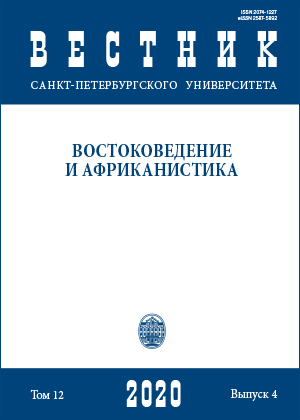Hand-written Russian-Chinese Dictionary from Collection of the Library of the Russian Academy of Sciences
DOI:
https://doi.org/10.21638/spbu13.2020.401Abstract
This article is dedicated to the analysis of a hand-written Russian-Chinese dictionary kept in the Manuscript Research Department of the Library of the Russian Academy of Sciences. The author identifies the principles of compilation that were used in the dictionary, and discovers the purpose of its compilation. The manuscript was gathered by Illarion K. Rossokhin, one of the first Russian teachers and translators of Chinese and Manchu. While in China, Rossokhin not only studied Chinese and Manchu languages, but also taught Russian language at a special school for Chinese officials. In this article, the author attempts to establish when the dictionary was written. As a result of the study, it was suggested that the compilation of the dictionary could have been started in China and finished in Russia. It was found that the manuscript does not have a unified structure. There are many repetitions and it is possible to note a tendency to group words according to thematic characteristics. The manuscript can be separated into three parts: the first part where there is some effort to group words in an unified structure; in the second part we can see a normal grouping in a unified order without titles; in the third part thematic paragraphs have titles. Creating a dictionary that was convenient for use by people who studied the Chinese language is one the possible reasons for utilizing a thematic structure. It is clear that dictionary was influenced by Chinese “category dictionaries” (leishu). The author’s analysis of the dictionary shows that it was used to teach conversational Chinese and it could also have been a source of information on the basics of Chinese grammar.
Keywords:
lexicography, Chinese language, history of Russian sinology, archival materials, dictionaries.
Downloads
References
Downloads
Published
How to Cite
Issue
Section
License
Articles of "Vestnik of Saint Petersburg University. Asian and African Studies" are open access distributed under the terms of the License Agreement with Saint Petersburg State University, which permits to the authors unrestricted distribution and self-archiving free of charge.





